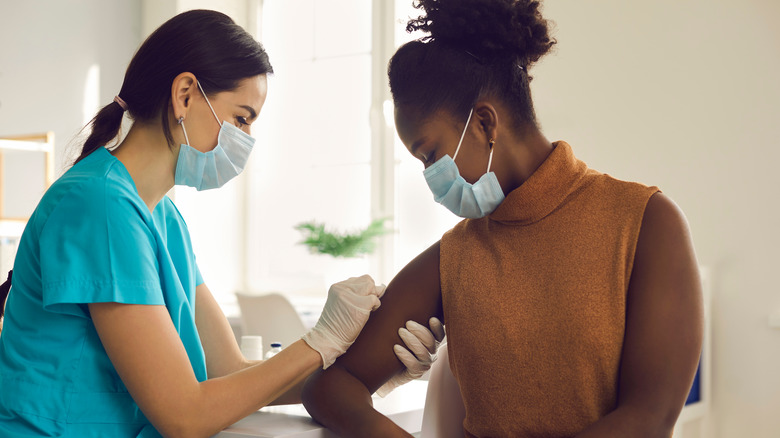Why Experts Say Your Vaccination Status May Not Predict Your Risk Of Dying From COVID
COVID is a form of respiratory illness that is caused from an infection by a particular type of coronavirus known as SARS-CoV-2, says Johns Hopkins Medicine. The outbreak of the novel coronavirus began in late 2019, and since then has caused a global pandemic. The virus spreads quickly due to its transmissibility through particles that can be passed from one person to another when breathing, coughing, talking, or even sneezing. Even worse, you may be able to get the virus from indoor spaces.
According to the Centers for Disease Control and Prevention, symptoms for COVID can show anywhere from a few days to a few weeks after you've been exposed to the virus. COVID symptoms can range from mild to severe, and include — but are not limited to — aches, cough, chills, fatigue, fever, headache, loss of smell or taste, trouble breathing, and sore throat. While the majority of people experience mild to moderate symptoms, others experience severe symptoms (via The Ohio State University). Severe cases of COVID can lead to death. While research shows that vaccines can protect against severe COVID, they may lose efficacy as time goes on, reports the Center for Infectious Disease Research and Policy. Growing evidence now suggests that your vaccination status may not predict your risk of dying from COVID. Here's everything you need to know.
Vaccination status and COVID death risk
In late 2021, reports emerged showing that an increasing amount of vaccinated Americans were dying from COVID (via NBC Montana). Experts concluded that the data reflected the fact that more people were receiving the vaccine. By the new year, the trend — a growing number of COVID deaths from the vaccinated — continued and experts warned that the vaccine could be losing efficacy over time, reported CNN. Data showed that those with a complete primary vaccine series but not a booster shot were estimated to be three times more likely to die from COVID.
A third piece of the trend was identified. Scientific American noted that the most at-risk group for death by COVID — Americans ages 65 and up — were predominantly vaccinated (91%), but only 68% got the first booster shot, and only 30% received the second booster. Considering that nearly three out of every four deaths from COVID in the United States occurred in this at-risk group — who are predominantly vaccinated — the numbers on COVID deaths among the vaccinated begin to paint a clearer picture. Now the trend of COVID deaths among the vaccinated has reached a milestone and has actually surpassed the total number of COVID deaths in America compared to the unvaccinated (per WebMD). Notably, experts still suggest getting vaccinated and boosted.


